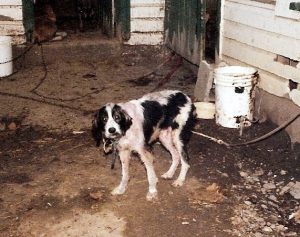Improve Outcome When Reporting Cruelty
NYSHA receives many calls from individuals who report incidents of animal cruelty to police and become frustrated by the lack of attention they receive. This apparent lack of response may occur for several reasons. By becoming aware of them, progress can be made to help animals.
One reason for inadequate response by police may result from a complainant’s lack of clarity. People are upset and may say, “There is a guy in Corinth on Maple Street who is neglecting his dog. Please do something.” When police ask for more specifics, the caller does not know them.

To get police attention, have your facts in order. There are generally two types of situations to deal with: one is a neglect case and the other is an emergency situation where the life of an animal is in imminent danger. For neglect: Specify the exact location where abuse is taking place and the name of the neglector if known. Describe to police the neglect you witnessed: lack of food and water, no shelter, etc. Was the animal in a place where the police can see it? Or did you happen to be inside a residence and witness a neglected animal? If the latter is the case, you need to provide the police with a sworn statement as to what you saw, so they have a basis to investigate the complaint. If you are afraid of signing a statement because you fear the person, tell that to the police, and they will work with you to shield your identity. If you properly report the complaint and you see no action, make a follow-up call.
For an emergency: Call 911 and explain what is happening. For example, the neighbor is outside beating his dog. Again, provide exact location and the facts you have. When police arrive, if the beating is still going on, they can make an arrest. If you have a cell phone with video, record the incident. If the neighbor has gone inside with the dog, you will have to provide a statement to police. In this case, your video will be a great asset to them. You must provide your identifying information to the police and attest to the fact that you took this video. Again, if you are afraid of the neighbor, explain that to the police to see what they can do to protect your identify.
Another reason police may not respond to an animal cruelty call is that they do not know what to do with the animals, especially if there are a large number of them. For example, a police agency receives a complaint that numerous horses are being neglected in a barn or field. If you are the complainant, you can assist police by providing them with the name of a horse rescue that would be willing to help the police with removal of the animals and to care for them temporarily. Also, a veterinarian is critical to an animal cruelty case, so if you know one who would be willing to assist police, that would help enormously.
Lastly, police may not be responsive to a complaint because they are not sure what to do. Unfortunately, because the animal cruelty statutes are in the Agriculture and Markets Laws, rather than in the Penal Law where they belong, they are not taught to recruits at the police academies. As a result, police may think that animal cruelty investigation is the responsibility of the Dog/Animal Control Officer. Again, you can assist police by printing a copy of Agriculture and Markets Article 26 and referring to it when reporting your case. The sections of the law that generally apply to cruelty cases are 350, 353, 353a, 355, and 371. You can also refer the police to the NYSHA website (nyshumane.org) where they can find our “Investigating Animal Cruelty” manual and examples of various documents they may need.Please be respectful when dealing with police officers.
To sum up: the key elements in reporting animal cruelty are having all the facts, being helpful by providing names of agencies and individuals who might help with animals, and mentioning the relevant laws.
After you file a complaint, please follow up, and be persistent if you feel nothing is being done.
What you can do to help with animal cruelty:
- Continue to support NYSHA and its work to improve the lives of animals.
- Contact your state legislators and inform them you want the cruelty laws moved to the Penal Law, and also contact Assemblyman McGee, who heads the Assembly Agriculture Committee. The addresses of legislators can be found on the these websites: http://assembly.state.ny.us/ and http://www.nysenate.gov/
- Write letters to the local newspapers supporting strong cruelty law enforcement.
New York State Humane Association Humane Review, Vol. XXVIII No. 2, Fall 2014/Winter 2014-2015.